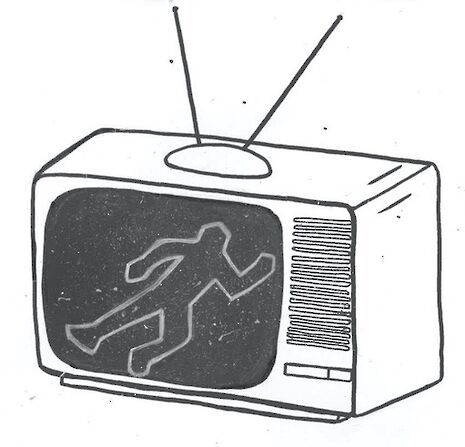Serial Season 3: When true crime meets justice
Exploring our relationship with the darker side of humanity, Helen Grant discusses the ethics of this morbid fascination and why it makes for such popular “entertainment”

Content note: this article contains references to murder, abduction, crime, and suicide.
I would like to propose a rule that I think governs our consumption of true crime journalism, because I think it tells us a lot about the success of the hit podcast Serial. The rule is this: if we want to get away with a certain amount of voyeurism, we have to at least pretend that it is in aid of justice.
We use it to rationalise what is essentially plain old morbid curiosity, that embarrassing relic of public executions and gawping at Bedlam that floats pickled in the dusty appendix jar of the human brain. We know it’s weird, but we can’t stop ourselves. We find tenuous excuses. Last summer I found a well-thumbed copy of Kate McCann’s book Madeleine sat on a bookshelf in a Portuguese holiday villa. ‘Our daughter’s disappearance and the continuing search for her’. No doubt in the previous months somebody had picked it out like a forgotten favourite, taken it to the poolside to continue the search in comfort.
“Season 3 is not a whodunnit and it isn’t easy listening, but it’s a credit to all those involved”
Serial, one of the most popular podcasts in history, finished its third season in November. It is the show that sanitised voyeurism. Season 1, concerning the murder of popular high-schooler Hae Min Lee, enjoyed a per-episode average of 2.25 million downloads. It loftily unpicked a potential miscarriage of justice: Hae’s ex-boyfriend, Adnan Syed, had already been locked up back in 2000; he was still protesting his innocence, and what if he had reason to? Voyeurism, justice.
The public eye narrowed and the public brow furrowed. In addition to the actual investigations taking place each week on the podcast, many more people joined in the conversation on Reddit. It was an internet circus. In 2016 we learned that Syed would be getting a retrial.
A single, sobering statement from the victim’s family: “It remains hard to see so many run to defend someone who committed a horrible crime … when so few are willing to speak up for Hae.”
Did the potential for justice here outweigh the voyeurism? For the Lees, not so much. And actually, like much of the recent true crime canon, Serial’s seminal first subject was ultimately rather toothless. The exhumation of a single murder can rarely be rationalised beyond a victory that is individualistic and limited in scope. Sure, something may have gone wrong for Syed, but even in the best case scenario from his perspective, we’re looking at one case. It’s also definitely up for debate whether a Cluedo-style podcast was really the most sensitive substitute for, you know, legal procedure.
“Our engagement with media that is based around strangers’ suffering – fictional or real – reminds us of a darker side to human nature”
Who cares about a car crash if you can’t slow down as you drive past? S-Town arguably swung completely towards voyeurism and ditched justice altogether. We praised it as an ‘audio novel.’ “I think trying to understand another person is a worthwhile thing to do”, producer Brian Reed told us, having just spent five hours spilling juicy details about the sex life and mental distress of a private individual who had committed suicide in Episode 2.
And yet. At the beginning of this year, a new law went into effect in Euclid, Ohio, concerning marijuana. Up until the airing of Serial Season 3, the city had had the harshest weed law out of all 59 municipalities of Cuyahoga County, low-level possession carrying a $1000 fine, a six-month prison sentence and, for at least one person, multiple kicks to the orbital bone and a tasering.
Serial’s coverage may have acted as a catalyst for a change in the law. And actually, if that’s surprising, then we’ve forgotten what journalism is: scrutiny, not just storytelling. Season 3 is not a whodunnit and it isn’t easy listening, but it’s a credit to all those involved. It’s also, literally, two journalists sitting in the Cleveland courts for a year and recording what they see.
As producer Sarah Koenig tells us, the team “didn't [have to] go to Cleveland and sift through hundreds of cases looking for the most egregious injustices.” Trevor Noah recently described Trump as a “cancer”; Serial vivisects a nation where “every joint in the skeleton of criminal justice system is greased by racial discrimination.”
“Let’s all accept that something’s gone wrong,” Koenig says. “Let’s make that our premise.” Our engagement with media that is based around strangers’ suffering – fictional or real – reminds us of a darker side to human nature, and we have to start thinking critically about what exactly we are finding entertaining here. Are we exploring our worst fears? Or our worst impulses? It isn’t just true crime podcasts, it’s a wider problem. It’s the reason why mainstream TV and cinema continue to miss the mark on what to show and what not to show, and how. The safety in numbers inherent to being part of an audience or a body of podcast listeners lets us get away with gawping, and it spreads the blame of bad taste thinly.
But while this is true, it is also true that numbers are exactly what investigative journalism needs. Without the blockbuster success of Season 1 and S-Town, Serial Season 3 would not have had the chance to get up quite as many noses as it did. And, no matter how they came to find the story, audiences are electors. They are petition signatories; they are demonstrators. If we’re attracted to crime and cruelty, why aren’t we looking at these things more broadly? We need to embrace the potency of our attention, and recognise that we have a duty to turn it towards the unsavoury open secrets still rotting in plain sight.
On 2 January 2019 public outrage and institutional shame had a direct impact on the lives of the people of Euclid. This was not a fluke. If we want to view crime, we have to actively make it so that it’s in aid of justice.
 Features / Should I stay or should I go? Cambridge students and alumni reflect on how their memories stay with them15 December 2025
Features / Should I stay or should I go? Cambridge students and alumni reflect on how their memories stay with them15 December 2025 News / Cambridge study finds students learn better with notes than AI13 December 2025
News / Cambridge study finds students learn better with notes than AI13 December 2025 News / Uni Scout and Guide Club affirms trans inclusion 12 December 2025
News / Uni Scout and Guide Club affirms trans inclusion 12 December 2025 Comment / The magic of an eight-week term15 December 2025
Comment / The magic of an eight-week term15 December 2025 News / News In Brief: Michaelmas marriages, monogamous mammals, and messaging manipulation15 December 2025
News / News In Brief: Michaelmas marriages, monogamous mammals, and messaging manipulation15 December 2025









